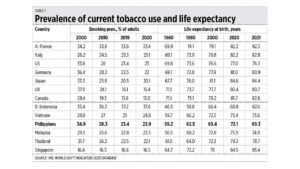On smoking, vaping, consumer choice and life expectancy

NICE, France — The issue of tobacco and vape control, taxation and illicit trade is among the topics in the Tholos Forum 2023 here. And these two recent reports in BusinessWorld caught my attention: “High tobacco taxes encourage smuggling, economist says” (Oct. 12) and “PHL to lose P60B from illicit tobacco” (Oct. 18).
The economist referred to in the first story is Alyssamae A. Nuñez, an Economics lecturer at the University of Asia and the Pacific. The figure of P60 billion/year of tax revenue losses from illicit and smuggled cigarettes came from Congressman Joey Salceda, Chairman of the House Committee on Ways and Means. In March 2021, Mr. Salceda’s estimate was P30 billion/year of foregone revenues from illicit tobacco. In just two years he has doubled his estimate of tax losses.
I have also written in this column several times on illicit tobacco and revenue losses, most recently in May, “The Laffer Curve of Philippine tobacco taxation,” and June, “The law of diminishing marginal utility and public policy.”
People in general are rational. They slowly step back from consuming more tobacco, alcohol, sugar, fatty food, and drinks as they learn more about the harmful effects of high consumption of these products. (Some, however, are hooked and pursue it even while understanding the consequences to their health.) They also step back from legal products when these become more expensive due to rising taxes and they shift to illegal products where prices are much lower than the legal ones.
I put together a table about smoking prevalence and life expectancy. Group A is made up of G7 industrial countries, and Group B is made up of the ASEAN-6 countries. Data from the World Bank shows there was a continued decline in smoking prevalence from 2000 to 2020. In the Philippines for instance, 35% of adults were tobacco users in 2000, and this declined to 23% by 2020. But note that these percentages refer to the consumption of legal tobacco and do not include illegal tobacco.
And even if 15% to 33% of adults are smokers in the G7, and 22% to 38% of adults in the ASEAN are smokers, life expectancy keeps rising across many countries. The narrative “more smoking, more drinking = more death” is not really confirmed (see Table 1).
As tobacco and alcohol tax rates keep rising, consumption shifts from legal and taxed products to illegal and untaxed products. And this will have a negative effect not only on government revenues but more importantly on the culture of corruption in government. Smugglers and criminal groups pay off officials from the national down to the barangay level so that they look the other way when the contraband and smuggled products come in and are sold openly.
On Day 2 of the Tholos Forum 2023 here in Nice, France, one panel discussion yesterday was on “Harm Reduction and Consumer Freedom” and the speakers were Anders Ydstedt, Chairman of Svensk Tidskrift, a weekly journal of economics, politics and culture in Sweden; Yuya Watase, Chairman of the Pacific Alliance Institute, a free market think tank in Japan; Luis Loria of IDEASLab, a think tank in Costa Rica; and Leonardo Chagas of Atlantos, a think tank in Brazil. The moderator was Tim Andrews of Tholos.
Ydstedt and Watase produced a paper, “Safer Nicotine Works: The Cases of Japan and Sweden,” and they showed this table (Table 2) on declining smoking rates. The primary source of data was not shown (most likely Organisation for Economic Co-operation and Development stats) but nonetheless, the trend is there — declining smoking rates as more people either have quit smoking and/or have shifted to illegal products or shifted to alternatives like vaping and snus (snuff) in Sweden.
Some important points to conclude and ponder.
One, the law of diminishing marginal revenues, the Laffer curve of optimal taxation, is real not fictional and is happening in the Philippines. As tobacco tax rates increase, people shift to illegal products and tax-paying legal products are hit, leading to reduced government tobacco tax revenues in 2022.
Two, people own their body and lives. Not the government, not the NGOs or media or doctors. Individual and consumer freedom means individual and parental responsibility of taking care of one’s body.
Three, harm reduction is a rational act by people. Instead of drinking 40% alcohol content whisky, they shift to 15% alcohol wine, or 5% alcohol beer. Instead of drinking high sugar soda, they shift to low or zero sugar soda. Instead of smoking cigarettes, they shift to vaping heated tobacco products or snus. Government and NGOs should respect those harm reduction acts, not demonize them.
Four, if a nanny state and NGOs really want to take over people’s behavior about their body, then they should be consistent. Regulate smoking, vaping and drinking; regulate sky jumping and deep-sea diving; regulate rock and tall trees climbing; regulate downhill cycling and cliff diving, and so on. Just one major mistake on those hobbies and adventures can lead to serious physical injuries if not death.
Five, government should focus on its basic functions that it was invented for in the first place: to protect the people’s right to life, right to property, and right to liberty. So, government should ban and control murder and killing, abduction and rape, stealing and destruction of property, bullying and killing people’s right to self-expression and mobility. When government is preoccupied with over-regulating smoking, drinking, vaping, gambling, etc., it will have little time to do its basic functions.
Finally, on individual freedom of expression: Among my favorite local rock bands is the Rockitwell band headed by fellow UP School of Economics alumnus Jack Teotico who owns Gallerie Joaquin. Now, Jack — the economist, the gallerist and the rock singer — is setting up a new and completely original musical titled Silver Lining. Producing a musical — whether it is on Broadway, off Broadway, the West End, or in Makati — like Silver Lining takes economic magic to make sense. The resources and talents to be harnessed are gargantuan. The audience will see Silver Lining starting this weekend, Oct. 20 to 22, then Oct. 27 to 29, at the Carlos P. Romulo Auditorium, RCBC Plaza in Makati. It stars Jack and noted thespians Ricky Davao, Raul Mabesa, Joel Nunez, and Starmagic talents like Krystal Brimner.
Bienvenido S. Oplas, Jr. is the president of Bienvenido S. Oplas, Jr. Research Consultancy Services, and Minimal Government Thinkers. He is an international fellow of the Tholos Foundation.




